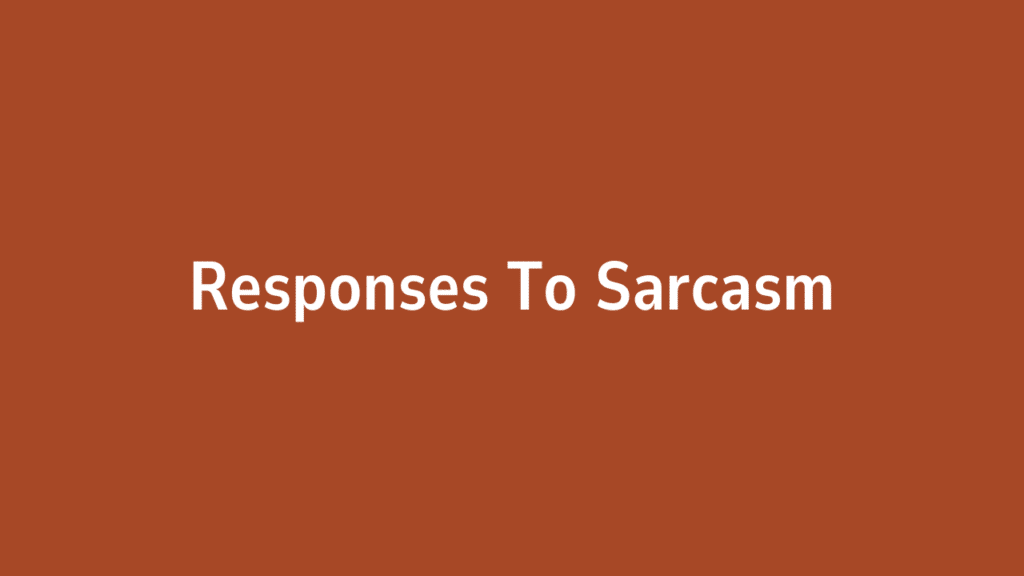Sarcasm can be a tricky thing. It’s often used in a lighthearted way to make a point or joke, but sometimes it can leave you feeling confused or even insulted. Whether you’re dealing with playful teasing or a more cutting remark, knowing how to respond to sarcasm is a valuable skill that can help you navigate tricky conversations with confidence. In this blog post, we’ll explore different types of sarcasm, why people use it, and a variety of responses to sarcasm that can make any situation easier to handle.
What Is Sarcasm?
Before we dive into how to respond to sarcasm, let’s first understand what sarcasm is. Sarcasm is the use of irony or mocking speech to convey a meaning that is opposite of the literal words. It often relies on tone of voice, facial expressions, or context to let the listener know the speaker isn’t being serious.
Examples of Sarcasm
- Example 1: When someone says, “Oh, great, another meeting!” but their tone is clearly annoyed, they’re being sarcastic. They don’t really think the meeting is great, but they’re expressing frustration.
- Example 2: “Wow, you’re such a genius for figuring that out,” said with a smirk, is sarcastic because it’s implying the opposite of praise.
- Example 3: “Oh, sure, I totally wanted to spill coffee on my shirt this morning,” indicating that the speaker is not happy about the incident.
Sarcasm can be humorous or hurtful depending on the context and the way it’s delivered. It can be hard to detect if you’re unfamiliar with it, and even harder to respond appropriately in the moment. But with a little practice, you can learn how to handle sarcasm and turn it to your advantage.
Why Do People Use Sarcasm?
Sarcasm is often used for humor, but it can serve other purposes as well. Here are a few reasons why people use sarcasm:
1. To Be Funny
Sarcasm is commonly used to make a joke. A witty remark or sarcastic comment can lighten the mood and add humor to a conversation. It’s often used among friends and in casual settings to keep things playful.
2. To Express Frustration or Discontent
Sometimes people use sarcasm as a way to express frustration, especially if they’re not comfortable confronting the issue directly. For example, a person might sarcastically say, “Oh, great, another flat tire!” instead of saying they’re actually upset.
3. To Be Self-Deprecating
Sarcasm can also be used as a way for people to poke fun at themselves. For example, someone might sarcastically say, “I’m the best at procrastinating,” as a way to acknowledge their tendency without feeling bad about it.
4. To Mask Vulnerability
Some people use sarcasm as a defense mechanism. By using a sarcastic remark, they can hide their true feelings or deflect attention from something they feel vulnerable about.
5. To Get Attention or Highlight Something Ridiculous
Sarcasm is also used to exaggerate a point or draw attention to something absurd. It’s a way to emphasize something unexpected or ridiculous, making it stand out in conversation.
6. To Show Intelligence or Wit
Some individuals use sarcasm to come across as clever or witty. By delivering a well-placed sarcastic comment, they may try to appear more intelligent or sharp.
Different Types of Sarcasm
Sarcasm can take many forms, and understanding the type of sarcasm being used can help you respond appropriately. Below are some common types of sarcasm and examples:
1. Playful Sarcasm
This is the kind of sarcasm that is often used between friends and in casual settings. It’s usually light-hearted and not meant to hurt anyone’s feelings.
- Example: “Oh, you didn’t take out the trash? What a surprise!”
- Response: “I know, I’m just full of surprises.”
2. Dry Sarcasm
Dry sarcasm is delivered in a very deadpan, emotionless way. It can sometimes be hard to detect because it’s not exaggerated or over-the-top.
- Example: “Yeah, because I’m totally enjoying this rainstorm.”
- Response: “Yeah, the puddles are perfect for swimming in.”
3. Cutting or Bitter Sarcasm
This type of sarcasm can be harsh and hurtful. It is often used when someone is frustrated, upset, or annoyed and may be directed at a specific person.
- Example: “Wow, you’re really good at making mistakes.”
- Response: “I know, I’m working on becoming a professional screw-up.”
4. Self-Deprecating Sarcasm
Some people use sarcasm to poke fun at themselves. It’s often done in a light-hearted way, but sometimes it can be a sign of insecurity.
- Example: “I’m so good at keeping secrets… except when I forget them two minutes later.”
- Response: “Hey, at least you have a good memory for the important stuff.”
5. Exaggerated Sarcasm
Exaggerated sarcasm is when someone makes a huge, over-the-top statement to emphasize a point, often in an absurd way.
- Example: “Oh, sure, I just LOVE getting stuck in traffic for two hours.”
- Response: “I know, it’s basically the highlight of my day!”
6. Sarcastic Praise
This type of sarcasm involves offering praise that is not genuine. It’s usually meant to mock or criticize something in an indirect way.
- Example: “You’re the best at showing up late, that’s for sure.”
- Response: “I’ll try to be even better next time.”
How to Respond to Sarcasm
Now that you understand the different types of sarcasm and why people use it, let’s explore some responses that you can use. The best response often depends on the type of sarcasm used and your relationship with the person making the remark.
1. Play Along
If the sarcasm is playful and you’re comfortable with the person, you can play along and offer a witty or sarcastic response in return. This keeps the conversation light-hearted and fun.
- Example: “I’m pretty good at procrastinating, too.”
- Response: “Oh, we’re like a team of procrastinators!”
2. Stay Calm and Avoid Reacting Emotionally
If the sarcasm is cutting or bitter, it’s best to remain calm and avoid reacting emotionally. Don’t let yourself get dragged into a negative response. Instead, take a deep breath and choose to respond with neutrality.
- Example: “Great, you’re always the one who messes up the project.”
- Response: “I’ll work on improving. Thanks for the feedback.”
3. Respond with Humor
Responding with humor is an excellent way to diffuse sarcasm, especially if the tone is light-hearted. It shows that you don’t take the comment too seriously, and it can shift the conversation in a more positive direction.
- Example: “Oh, sure, I’m the best at being on time, right?”
- Response: “Of course, I have a PhD in punctuality!”
4. Ignore the Sarcasm
Sometimes, ignoring sarcasm altogether is the best approach, especially if it’s intended to provoke a reaction or start an argument. By not reacting, you take away the power from the sarcastic remark.
- Example: “Wow, you’re so good at ignoring everything I say.”
- Response: (Say nothing and continue the conversation as if nothing happened.)
5. Call Out the Sarcasm
If the sarcasm is getting too much or feels hurtful, it’s okay to call it out in a calm, respectful way. This can help set boundaries and remind the person that their tone is not appreciated.
- Example: “Oh, great, another mistake. Just what I needed.”
- Response: “I understand you’re frustrated, but I’d prefer if we could talk about this constructively.”
6. Respond with a Compliment
If the sarcasm is directed at you in a humorous or lighthearted way, responding with a compliment can help disarm the sarcasm. It shows that you’re not offended and that you can handle the situation with confidence.
- Example: “I can’t believe how often you lose things!”
- Response: “You know, you’re always so organized, it’s impressive!”
7. Use Self-Deprecating Humor
If you want to keep things light, you can use self-deprecating humor. This shows that you don’t take yourself too seriously and are able to laugh at yourself.
- Example: “Of course you forgot to do that. Classic.”
- Response: “Yep, I’m basically a walking disaster. Just don’t tell anyone!”
8. Stay Positive
In some cases, it’s helpful to simply respond with positivity, even if the sarcasm is a little biting. Responding with optimism can shift the conversation in a more pleasant direction.
- Example: “I can’t believe you’re still working on that!”
- Response: “It’s been a challenge, but I’m almost done!”
Table: Responses to Different Types of Sarcasm
| Type of Sarcasm | Example | Response Type | Example Response |
|---|---|---|---|
| Playful Sarcasm | “Oh, you’re always on time, right?” | Play Along | “Yep, I’m always early, actually!” |
| Dry Sarcasm | “Yeah, this rain is so much fun.” | Respond with Humor | “Perfect weather for a swim, right?” |
| Cutting Sarcasm | “I can’t believe you messed up again.” | Stay Calm & Neutral | “I’ll make sure to do better next time.” |
| Self-Deprecating Sarcasm | “I’m amazing at forgetting things.” | Respond with Humor | “Maybe I need a memory upgrade!” |
| Exaggerated Sarcasm | “Oh, yeah, I love spending two hours in traffic!” | Respond Positively | “At least you got some good music in!” |
| Sarcastic Praise | “You’re great at messing everything up.” | Respond with Humor | “I’ll work on my skillset next time!” |
Conclusion
Dealing with sarcasm doesn’t have to be a stressful or confusing experience. By understanding the different types of sarcasm and practicing how to respond, you can navigate these tricky situations with ease. Whether you play along, stay calm, or use humor to deflect the remark, responding confidently will ensure you handle sarcasm with grace. So next time someone throws a sarcastic comment your way, you’ll be ready with a response that works for you.



